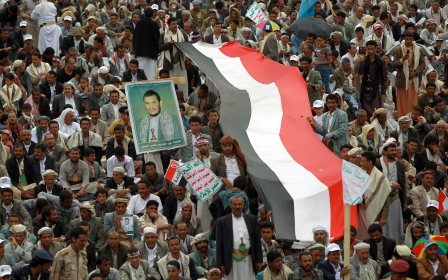Yemen's airport closed for a second day, as clashes continue in the capital

Flights to the Yemeni capital were suspended for a second straight day Saturday as the toll mounted from clashes between pro-government forces and rebels despite UN efforts to reach a ceasefire.
Forces allied to the government have been battling to halt Shiite rebels who have swept into Sanaa from their stronghold in the rugged northwestern mountains.
The fighting has shut shops, schools and the country's main international gateway, raising fears that the capital could fall to the rebels who are demanding economic and political reforms.
"The suspension of the flights of Arab and foreign countries is continuing," an airport source said, while residents in areas near the airport said that air traffic had virtually ceased.
The only aircraft to touch down since Friday was a military plane bringing UN envoy Jamal Benomar back from the rebel stronghold of Saada.
Benomar spent three days in the northern city trying to negotiate a ceasefire with rebel chief Abdelmalek al-Houthi.
The rebels, who have been camped north of Sanaa for weeks, hail from the Zaidi Shiite community, a minority in the mostly Sunni nation, and are believed to be trying to establish themselves as the main political force in the region.
Also known as Ansarullah, they have battled the government for years from their heartland of Saada, complaining of marginalisation.
Benomar did not reach agreement with Houthi but said the two sides were making progress.
"I have tried to narrow the gap between the two parties and we've agreed on a number of points that can serve as the basis of an accord," Benomar told reporters.
Yemen, an important US ally in the fight against Al-Qaeda, has in recent years been under pressure on several fronts including militant attacks and demands in the south for independence.
Its proximity to oil-flush Saudi Arabia and important shipping lanes in the Gulf of Aden have heightened fears of it becoming a failed state like Somalia.
'Coup attempt'
President Abdrabuh Mansur Hadi called the rebel offensive a "coup attempt" as he received ambassadors from the countries that helped to foster the political agreement that ended Saleh's rule.
Yemeni media outlets said on Saturday that he saw proof of this in the targeting of the headquarters of the state broadcaster, which was forced to interrupt its transmissions for one hour on Friday.
Clashes raged between the two sides in northern Sanaa on Saturday morning.
Medics said three civilians were killed in a bombardment of the main road in the area, near the Iman University that rebels tried to seize from fighters of the Sunni Islah (Reform) party.
A hospital in the area was also hit by shellfire, leaving one person dead and three wounded, a hospital worker said.
Another 18 civilians have been killed in the area during three days of clashes, a toll from hospital sources said, and residents were sheltering in their homes on Saturday.
The rest of the city was also quiet, with many businesses closed and little traffic on the roads.
Rebels fired several shells at the former headquarters of the first armoured division, sending plumes of smoke into the sky.
And the nearby Sanaa University told students to stay on holiday until mid-October after its campus was also hit by artillery.
The education ministry ordered schools to suspend lessons indefinitely.
One of the capital's main markets, the Ali Mohsen Souk, has been closed for three days, which residents said has started to cause problems in obtaining fruit and vegetables.
Hadi has already agreed to involve the rebels in the formation of a new government to replace the unpopular administration that imposed austerity measures, including a fuel price hike, earlier this year.
But the rebels are also demanding posts in key state institutions as part of a push for greater political clout.
Middle East Eye propose une couverture et une analyse indépendantes et incomparables du Moyen-Orient, de l’Afrique du Nord et d’autres régions du monde. Pour en savoir plus sur la reprise de ce contenu et les frais qui s’appliquent, veuillez remplir ce formulaire [en anglais]. Pour en savoir plus sur MEE, cliquez ici [en anglais].




